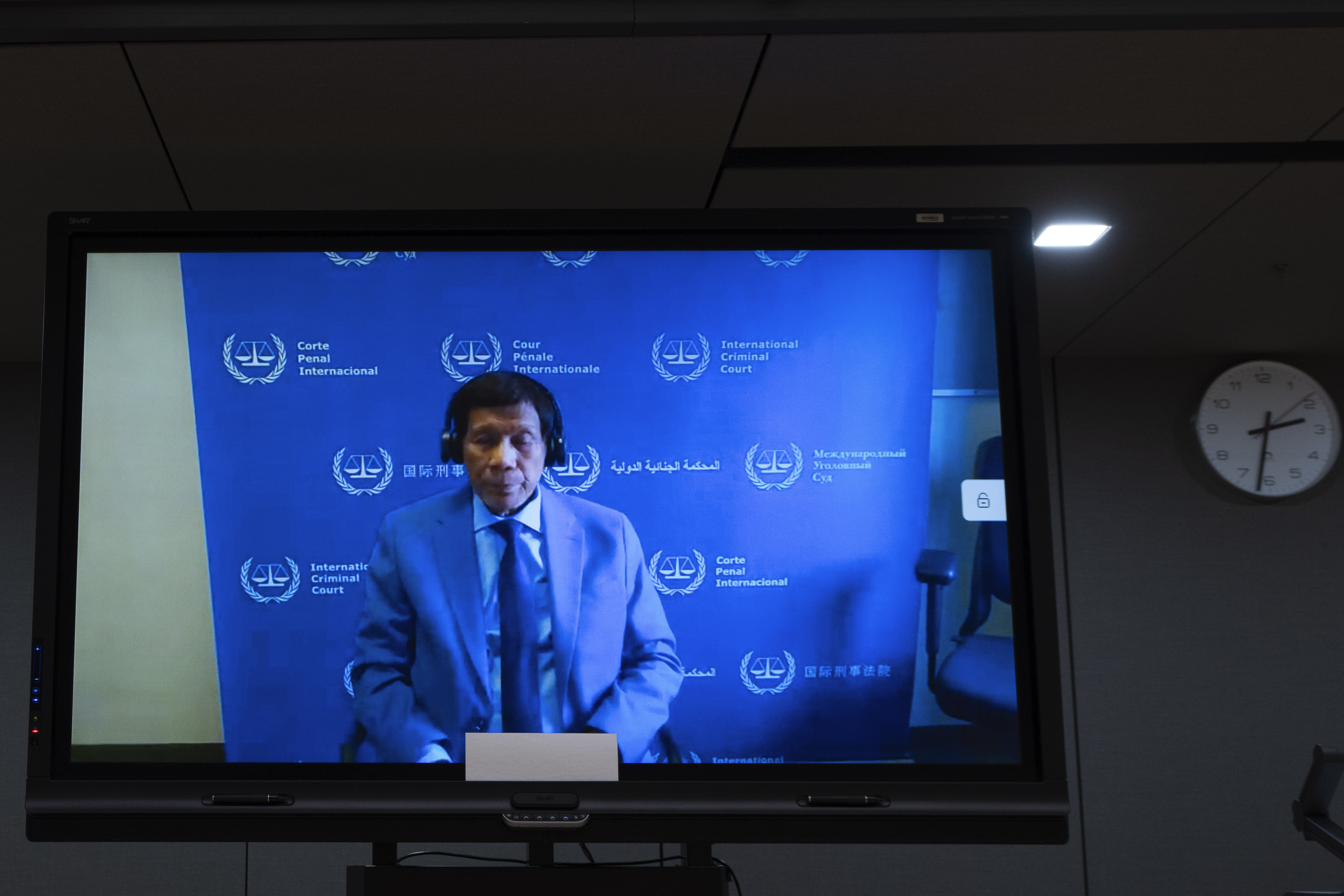Why the ICC detention of Duterte is a legal overreach

Former Philippine President Rodrigo Duterte is seen on a screen in the courtroom of the International Criminal Court (ICC) in The Hague, Netherlands, Friday, March 14, 2025. (AP Photo/Peter Dejong, Pool)
 The International Criminal Court (ICC) was created with a noble goal: to hold perpetrators of the world’s worst crimes accountable when national systems fail. But what happens when that very system of international justice violates the sovereignty and legal order of a democratic state?
The International Criminal Court (ICC) was created with a noble goal: to hold perpetrators of the world’s worst crimes accountable when national systems fail. But what happens when that very system of international justice violates the sovereignty and legal order of a democratic state?
The arrest and current detention of former Philippine President Rodrigo Roa Duterte by the ICC provides a troubling and dangerous precedent – one that exposes deep flaws in the Court’s jurisdictional reach and the politicization of international justice.
Despite the Philippines’ formal withdrawal from the Rome Statute on March 17, 2019, the ICC proceeded with its investigation into alleged crimes committed during Duterte’s presidency. That investigation has now culminated in the unprecedented arrest and transfer of a former head of state of a non-member state. This act is not only controversial – it is legally and constitutionally infirm.
A treaty cannot bind a non-member state
Under Article 34 of the 1969 Vienna Convention on the Law of Treaties, the doctrine of pacta tertiis nec nocent nec prosunt – that treaties neither impose obligations nor grant rights to non-parties – remains a bedrock of international law.
With its withdrawal from the Rome Statute completed, the Philippines ceased to be legally bound by its provisions. Consequently, the ICC’s continued assertion of jurisdiction over former President Duterte, and worse, his actual detention, disregards this foundational principle.
The ICC invokes Article 127(2) of the Rome Statute to claim residual jurisdiction for acts allegedly committed during membership. However, this claim becomes highly questionable when exercised against a former head of state now detained without the constitutionally required judicial oversight of his sovereign nation. The ICC’s logic distorts legal interpretation and ignores geopolitical reality.
Complementarity is not a loophole—It’s a legal pillar
The Rome Statute’s cornerstone principle is complementarity. Under Article 17, the ICC may only act if a nation is “unwilling or unable” to prosecute alleged crimes. The Philippines does not meet this threshold.
From People v. Estrada to Francisco v. House of Representatives, the Philippine judiciary has demonstrated both capacity and willingness to hold its leaders accountable. The Office of the Ombudsman, the Department of Justice and independent courts have prosecuted sitting and former public officials. The assumption that the Philippines is incapable of domestic accountability is both factually and legally baseless. The ICC’s action disregards this record and undermines its own founding charter.
Arrest without Philippine warrant is unconstitutional
The arrest of President Duterte, carried out without a domestic arrest warrant or court order from the Philippines, violates the Philippine Constitution. Under People v. Burgos and Article III (Bill of Rights), no arrest is valid unless authorized by Philippine judicial authorities, except under narrowly defined exigent circumstances.
The ICC’s imposition of its authority, in defiance of Philippine constitutional processes, constitutes foreign intervention. It is a blatant disregard of sovereign legal order and undermines the rule of law within the Philippines.
Surrender without judicial oversight is void ab initio
Any attempt by Philippine government officials to facilitate the transfer or surrender of former President Duterte to the ICC, without the required legal process before a competent Philippine judicial authority, is void ab initio. The Department of Justice (DOJ), being part of the executive branch, lacks the constitutional authority to determine the validity or enforceability of a foreign-issued warrant of arrest. Its claimed authority to permit such a surrender is without legal basis and oversteps the separation of powers.
In the absence of judicial review by a Philippine court of competent jurisdiction, any purported consent or facilitation of the surrender is unconstitutional, a clear violation of due process and a direct affront to the rule of law and Philippine sovereignty. The act of transferring a former head of state to an international tribunal without lawful judicial imprimatur nullifies the legitimacy of the entire process.
A dangerous rendition: Male captus bene detentus?
The ICC’s reliance on the controversial doctrine of male captus bene detentus – that a person improperly seized may still be tried – mirrors precedents like US v. Alvarez-Machain. However, applying such a doctrine to a democratically elected former president of a sovereign nation, no longer bound by the ICC, sets a catastrophic precedent in international law.
This move effectively normalizes illegal abductions and extra-territorial seizures. It violates the prohibition on the use of force or coercion against sovereign states under Article 2(4) of the UN Charter and resurrects an era of unilateralism dressed in the robes of justice.
Is the ICC now a political tool?
There is growing global concern that the ICC disproportionately targets leaders from the Global South. The African Union has raised repeated alarms. Now, with the detention of Duterte, the Philippines joins a growing list of nations questioning the impartiality and legitimacy of the ICC.
In Saguisag v. Executive Secretary (2016), the Philippine Supreme Court upheld the President’s constitutional authority to withdraw from treaties. The decision to exit the Rome Statute was a sovereign act, not a shield of impunity. By ignoring that, the ICC undermines treaty law and oversteps its limits.
The better path forward
If international justice is to survive and retain legitimacy, it must be rooted in respect for sovereignty, consent of states and strict adherence to legal norms. The detention of Duterte, absent lawful domestic judicial process in the Philippines, is an affront to these principles.
The Philippines possesses functioning institutions of justice. The arrest and detention of its former President by an external tribunal – despite its withdrawal from said tribunal’s jurisdiction – marks a serious erosion of the international legal order.
True justice cannot be born out of lawless enforcement. The ICC must be reminded that it is a court of last resort – not an enforcer of politicized mandates. For justice to prevail, former President Duterte must be released, and the ICC must be held accountable to the very legal standards it claims to uphold.
Atty. Arnedo S. Valera is the executive director of the Global Migrant Heritage Foundation and managing attorney at Valera & Associates, a U.S. immigration and anti-discrimination law firm for over 32 years. He holds a master’s degree in International Affairs and International Law and Human Rights from Columbia University and was trained at the International Institute of Human Rights in Strasbourg, France. He obtained his Bachelor of Laws from Ateneo de Manila University. He is a professor at San Beda Graduate School of Law (LL.M. Program), teaching International Security and Alliances.

